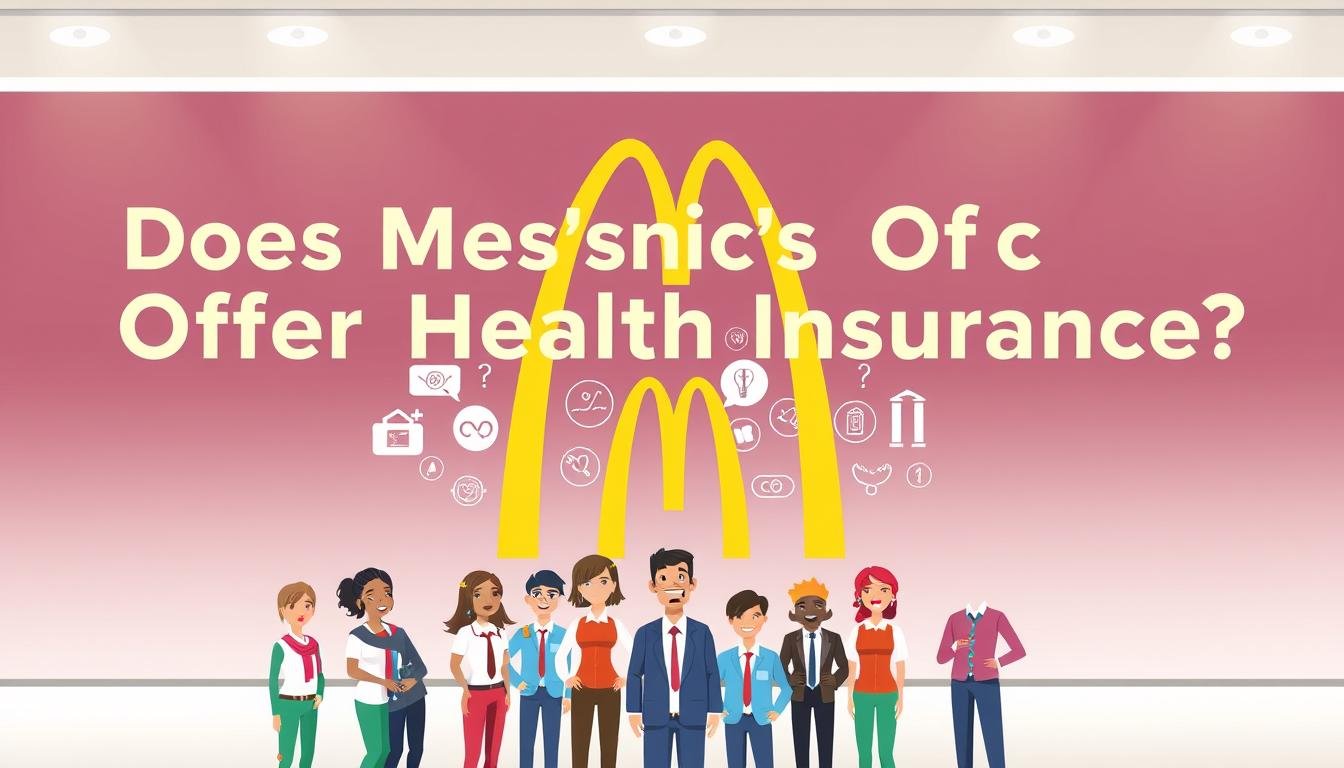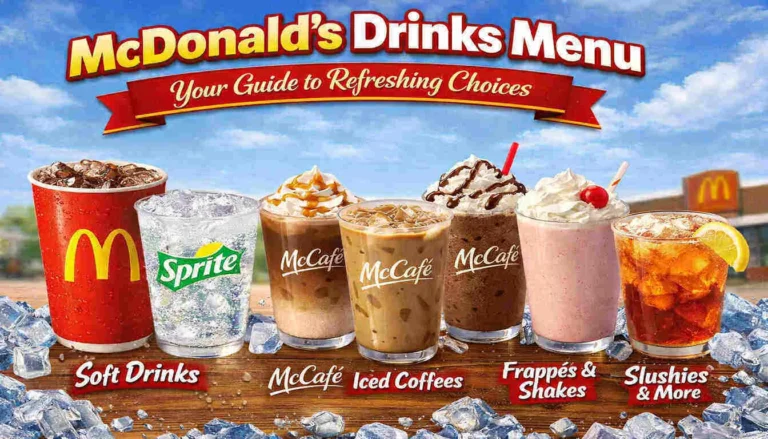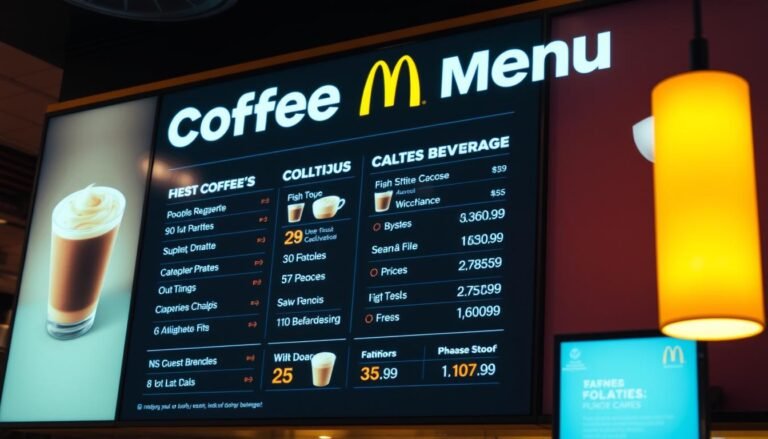Does McDonald’s Offer Health Insurance?
McDonald’s offers health insurance in the United States, but it depends on your location and work hours. The company’s corporate pages and benefits summaries show that eligible employees at corporate locations can get medical, dental, and vision plans. However, plan details vary by role, state, and employment status.
Franchise-owned restaurants have their own rules, so benefits at a local McDonald’s might be different. This means health insurance at McDonald’s can range from good plans with employer help to limited options or other benefits at some franchises.
Who gets insurance and how much they pay depends on if they work full-time or part-time and state laws. New employees get an Employee Benefits Guide or Summary Plan Description (SPD) during onboarding. This guide is the best source for understanding mcdonald’s employee benefits.
Key Takeaways
- Yes — McDonald’s offers health insurance options, but availability varies by location and employment type.
- Corporate-owned restaurants generally follow McDonald’s national benefits framework.
- Franchise owners may provide different plans or eligibility rules at local restaurants.
- Full-time status usually gives broader access to medical, dental, and vision coverage.
- Refer to the Employee Benefits Guide or SPD for exact mcdonald’s health insurance coverage details.
does mcdonald’s offer health insurance
Many people wonder if McDonald’s offers health insurance to its employees. The answer varies based on where you work and your job status. Restaurants owned by McDonald’s Corporation usually have the same benefits. But, restaurants owned by franchisees might offer different options.
Overview of McDonald’s benefits landscape
McDonald’s benefits include medical, dental, and vision plans. They also offer life and disability insurance, 401(k) matching, and paid time off. Plus, there are education programs like Archways to Opportunity.
Corporate employees usually get the same benefits. But, franchisees can choose what benefits to offer. This means benefits can vary by location.
Quick answer for current and prospective employees
Yes, many McDonald’s employees have access to health insurance. If you’re applying for a job, ask about the health insurance options. Look at the benefits summary to understand what’s available at your location.
How eligibility typically works across U.S. restaurants
Eligibility for benefits depends on how many hours you work and how long you’ve been with the company. Full-time employees typically work 30 hours a week or more. Benefits usually start after a 30 to 90 day waiting period.
Part-time workers might have access to limited or voluntary plans. This depends on the franchise and local laws.
If you want specific details, check the summary plan description. Or, ask your local manager or HR about the health insurance policy and when you can enroll.
McDonald’s health insurance coverage for full-time employees
Full-time crew and management at McDonald’s get employer-sponsored plans. These plans are a big part of their benefits. But, what you get can change based on where you work and if it’s a corporate or franchise restaurant.
Many workers look at plan documents to see what’s available in their area. They check which networks and carriers are included.
McDonald’s offers different types of plans, like HMOs and PPOs. Some plans are high-deductible health plans with Health Savings Accounts. This lets employees pick between lower premiums with fewer network options or higher premiums for more access to providers.
How much McDonald’s pays for premiums varies by plan and location. Single coverage usually costs less than family plans. Deductibles and out-of-pocket maximums can change yearly with carrier rate updates. It’s important for employees to compare plan details before signing up.
Enrollment for plans happens at hire and during annual open enrollment. Plans usually start on the first of the month after enrollment. But, there’s a waiting period first. Special events like marriage or birth can let you enroll outside of the usual times.
When choosing a plan, think about premium share, deductible size, network flexibility, and HSA eligibility. These factors affect how well the plan covers routine care and emergencies. Keep plan summaries handy and ask HR for the latest details on McDonald’s benefits.
| Feature | Typical Options | What to Check |
|---|---|---|
| Plan types | HMO, PPO, HDHP with HSA | Network size, referral rules, HSA eligibility |
| Premiums | Employee-only, Employee + spouse, Family tiers | Employer contribution rates, monthly employee share |
| Deductibles & OOP max | Low to high depending on tier | In-network vs out-of-network differences, annual limits |
| Enrollment timing | Post-hire waiting period; annual open enrollment; special events | Effective date rules, required documentation for qualifying events |
| Cost-control tools | HSAs, telehealth, preventive in-network coverage | HSA contribution limits, telehealth access details |
Part-time employee healthcare options at McDonald’s
Part-time jobs at McDonald’s offer many health benefits. The coverage varies based on if the place is owned by the company or a franchise. This section explains what you can expect and the choices available for those working part-time.
Variability between corporate and franchise locations
Corporate restaurants usually have a standard set of benefits. These include medical and voluntary plans for part-time workers. However, franchise owners decide their own policies.
Some franchises offer dental, vision, or limited medical plans. Others might not provide any employer-sponsored coverage.
Minimum hours and eligibility thresholds
The rules for getting benefits vary. Many places consider 30 hours a week as full-time. But, the rules can change based on the region and the owner.
Managers and assistant managers often get full-time benefits. Crew members qualify if they work enough hours, as set by the franchise or corporate rules.
Alternatives for part-time workers
Part-time workers have other options besides employer plans. They can choose from dental, vision, and short-term medical plans. They might also use tax-advantaged accounts like an HSA or FSA.
Those with lower incomes can check Medicaid or the ACA marketplace for help. Spousal or parental coverage is also an option. Some places offer discounts, basic telehealth, or wellness resources to help fill gaps in coverage.
| Option | Who it’s for | Typical cost | Notes |
|---|---|---|---|
| Corporate scaled benefits | Part-timers meeting corporate hours | Lower than full plans, varies | Availability depends on whether restaurant is corporate-owned |
| Franchise voluntary plans | Part-time staff at franchised stores | Employee-paid premiums | Includes dental, vision, short-term medical in some locations |
| ACA marketplace | Individuals and families | Subsidy-based, income dependent | Good option when employer plans are unavailable or unaffordable |
| Medicaid | Low-income workers | Free or minimal cost | Eligibility varies by state |
| Spousal/parental coverage | Dependents | Depends on employer of spouse/parent | Often cost-effective for young workers |
| Telehealth and discounts | All part-time employees where offered | Low or no cost | Serves as short-term access to care and advice |
Understanding McDonald’s employee benefits package beyond insurance
McDonald’s offers more than just medical plans. Workers can choose from dental and vision options, mental health support, telehealth services, and wellness programs. These extras make up the full McDonald’s healthcare benefits package for many employees.
Dental and vision coverage
Many plans include optional dental and vision coverage or voluntary stand-alone policies. Preventive exams and routine cleanings or eye exams are usually covered at higher rates. Major services like crowns or orthodontia tend to appear only in higher-tier options and carry greater cost-sharing.
Mental health and telehealth services
Behavioral health services are a common part of the mix. McDonald’s employee benefits often include Employee Assistance Programs that provide short-term counseling at low or no cost. Telehealth options let employees see primary care and behavioral health clinicians without in-person visits, which lowers time off work and travel expenses.
Wellness programs and EAPs
Wellness initiatives target smoking cessation, weight management, and health coaching. These programs aim to improve well-being and reduce long-term costs. Employee Assistance Programs add confidential counseling plus legal and financial referrals to support staff during tough times.
When comparing offers, check plan summaries for covered services, copays, and limits. Understanding non-medical perks completes the picture of McDonald’s health insurance coverage. It highlights the broader value of McDonald’s employee benefits within the McDonald’s healthcare benefits package.
How McDonald’s health insurance policy works with franchise-owned restaurants
Many crew members wonder: does mcdonald’s offer health insurance at every location? The answer is not simple. Corporate-owned restaurants usually follow McDonald’s USA’s national benefits. But, franchise owners have their own choices, affecting local coverage.
Differences between corporate-owned and franchise policies
Corporate locations often have the same plan options and clear rules. They also provide help with enrolling. Franchisees, however, can pick their own carriers and set premium splits. This means different plans and services in different areas.
Questions to ask your local franchise HR or manager
- Is this restaurant corporate-owned or independently franchised?
- Which medical, dental, and vision plans are available to employees?
- What are the eligibility thresholds for full benefits, including hourly minimums and waiting periods?
- How much will I pay in premiums and what are typical out-of-pocket costs?
- Are mental health and telehealth services included in the plans?
- When can I enroll and what documentation is required?
- Are there 401(k) matches, paid time off, or tuition assistance available?
Examples of varying offerings across regions
In big cities, some franchises offer PPO plans with more providers but higher costs. In rural areas, HMO plans with fewer providers but lower costs are common. Places with Medicaid expansion often see part-time workers use Medicaid.
Knowing if a restaurant’s health insurance is corporate or franchise-run is key. Ask specific questions about local plans. This way, you can see if McDonald’s health insurance meets your needs.
Comparing McDonald’s healthcare options with other fast-food employers
Fast-food chains offer different pay and benefits packages. McDonald’s is known for its mix of benefits for eligible staff. People wonder if McDonald’s health insurance is better than Burger King, Wendy’s, Starbucks, and Chipotle.
How McDonald’s stacks up on coverage and costs
McDonald’s benefits include medical plans, tuition help, and retirement plans for some workers. The quality of these benefits can vary by location and ownership. Full-time workers might find good deals on premiums and deductibles, but part-time workers face more uncertainty.
Common benefits competitors provide
Starbucks is famous for its wide health coverage and tuition aid. Chipotle and some local chains focus on mental health and telehealth. Burger King and Wendy’s benefits vary by franchise. It’s important to look at what each plan covers and who is in-network.
What prospective hires should compare
Look at premium costs, deductibles, and who is in-network. Check if mental health or telehealth is included. Also, consider eligibility, waiting periods, and any extra benefits like dental and vision. Don’t forget to compare wages, work schedules, and tuition support with health benefits.
| Factor | McDonald’s | Starbucks | Chipotle | Burger King / Wendy’s |
|---|---|---|---|---|
| Medical insurance for eligible employees | Common at many locations; franchise-driven availability | Company-wide options for eligible partners | Offered to eligible crew and managers | Varies widely by franchise |
| Mental health / telehealth | Included in many plans or offered via EAP | Robust telehealth and mental health resources | Telehealth access improving across stores | Spotty; depends on franchisor and local policies |
| Tuition assistance | Tuition aid programs available for many employees | Industry-leading tuition benefits | Tuition support for eligible staff | Limited or franchise-specific programs |
| Standardization across locations | Less uniform due to franchise model | More standardized corporate policy | Mix of corporate and franchise consistency | High variability across regions |
| What to verify during hiring | Plan costs, networks, eligibility hours | Enrollment rules and partner benefits details | Waiting periods and scope of coverage | Local franchise policy and employee cost-sharing |
How to enroll in McDonald’s health insurance and required documentation
New hires and current crew members can sign up for benefits through onboarding or the company benefits portal. It’s easy and helps employees pick the right mcdonald’s healthcare options for their budget and family.
Step-by-step enrollment process
1. Get your enrollment packet during orientation or an email with portal instructions.
2. Create or log into the McDonald’s benefits portal, where plan details appear.
3. Compare plan types, pick one, add dependents, and opt into pre-tax accounts such as HSA or FSA.
4. Authorize payroll deductions and confirm effective dates. Open enrollment each year lets you change plans.
Required documents and verification
Proof of identity and Social Security numbers for the employee and any dependents are commonly required.
Dependents may need birth certificates or a marriage certificate to verify eligibility.
Some franchises request documents showing dependent residency or prior coverage when validating special enrollments.
Special enrollment events and qualifying life changes
Qualifying life events allow mid-year enrollment. Examples include marriage, the birth or adoption of a child, or loss of other coverage.
When you lose outside coverage, track COBRA notices and deadlines carefully to maintain continuous mcdonald’s health insurance coverage.
If your hours change significantly, ask your manager or HR about eligibility, since shifts between part-time and full-time can affect mcdonald’s healthcare options.
Costs and financial assistance related to McDonald’s healthcare benefits
When you ask if McDonald’s offers health insurance, the answer depends on several factors. These include how many hours you work and if you’re in a corporate or franchise location. Full-time workers often get help from their employer for premiums, but they still pay through payroll deductions.
Employee contribution vs. employer contribution
The amount employers contribute varies by plan and location. Some places pay more for better plans. Employees usually split costs with their employer for premiums, deductibles, copays, and coinsurance. Check the Summary Plan Description for specific details and examples of monthly deductions.
Subsidies, discounts, and tax-advantaged accounts (HSA/FSA)
Many McDonald’s plans come with Health Savings Accounts (HSA) for high-deductible health plans. Employees can use HSAs for pre-tax medical expenses. Flexible Spending Accounts (FSA) for medical and dependent care are also common. Some locations offer wellness incentives or employer credits to help lower costs.
If employer coverage is too expensive, you might qualify for federal subsidies through the ACA marketplace. Your eligibility depends on your household income and if the employer plan is affordable. Use your plan’s affordability notice to compare during open enrollment.
COBRA and continuation coverage options
When you lose your job, COBRA lets you keep group coverage at your own cost plus a fee. COBRA usually lasts up to 18 months. State programs might offer different rules. Your rights and next steps are detailed in COBRA notices and the SPD from the benefits administrator.
To understand costs for a specific McDonald’s health insurance policy, ask HR for plan illustrations. These will show employer contributions, your costs, and if HSAs or FSAs are available under the mcdonald’s healthcare benefits package.
Real employee experiences with McDonald’s healthcare benefits
Many McDonald’s workers share their honest thoughts on the company’s benefits. They often talk about the medical, dental, and vision plans for full-time staff. They also praise the telehealth and employee assistance programs for their quick help.
Some employees value the Archways to Opportunity and 401(k) matching. These perks add to their overall satisfaction with McDonald’s healthcare options.
Common praise points from employees
Full-time staff appreciate the reliable health insurance coverage. They say telemedicine saves time and dental and vision plans add value. Corporate restaurant employees find the plan details clearer and enrollment smoother.
Education support through Archways helps in keeping employees. It makes the benefits feel more complete when combined with other perks.
Typical complaints and limitations reported
Many workers worry about the differences in health insurance between corporate and franchise locations. Part-time staff often lack access to medical plans. They also mention high deductibles and narrow HMO networks.
Some employees find the plan rules complex and are surprised by out-of-pocket costs. These issues are common in discussions about McDonald’s healthcare options.
Where to find reviews and verified employee testimonials
Prospective and current employees can find reviews on Glassdoor and Indeed. LinkedIn and Blind also have discussions about benefits. Benefit forums share real experiences and tips for enrollment.
For detailed information, check official plan documents and state labor department resources. They help compare McDonald’s employee benefits and health insurance coverage.
| Source | What you find | How it helps |
|---|---|---|
| Glassdoor | Verified employee reviews on benefits and work life | Offers a mix of praise and complaints to gauge real experiences |
| Indeed | Ratings and benefit summaries from past and current staff | Good for quick comparisons of coverage and costs |
| Employee posts about career growth and benefit use | Shows professional perspectives on wellness and education perks | |
| Blind | Anonymous discussions about plan details and employer practices | Highlights candid issues like variability across franchises |
| Plan documents / SPD | Official coverage rules, eligibility, and cost sharing | Provides authoritative answers about mcdonald’s health insurance coverage |
| State labor departments | Regulatory guidance and employer compliance details | Useful for confirming legal requirements and protections |
How to get accurate, up-to-date information about McDonald’s healthcare benefits
Want to know if McDonald’s offers health insurance? Start by talking to your workplace’s key people. Your store manager, franchise owner, or HR can tell you about benefits and who gets them. They also have access to the McDonald’s benefits portal and a hotline for more info.
Ask your employer for written summaries of benefits. This way, you can easily compare details like premiums and covered services. It helps you remember important information without relying on memory.
Read the official plan documents for the real scoop. The Employee Benefits Guide and Summary Plan Description (SPD) list what’s covered and what’s not. They also explain how claims are handled and what you might pay out of pocket.
Check with your state’s insurance department and Medicaid office. They can tell you if McDonald’s plan meets local rules and if you qualify for subsidies.
Use Healthcare.gov to compare plans. It lets you see how McDonald’s coverage stacks up against other options. It also shows if you’re eligible for subsidies if you lose your job.
For a better understanding, talk to an independent broker or insurance navigator. They can help you compare plans based on things like deductibles and prescription coverage. This way, you can make a choice that’s right for you.
When you ask for info, have a checklist ready. Include things like eligibility rules, when you can enroll, how premiums are split, and how to file a claim. Save any emails or PDFs for later reference to confirm details about McDonald’s health insurance for your role.
Tips for maximizing your McDonald’s health insurance benefits
To get the most from McDonald’s benefits, start with a plan that matches your life. Think about doctor visits, prescriptions, and procedures you might need. Compare the cost of premiums to deductibles and out-of-pocket costs.
If you can get a high-deductible plan with an HSA, consider the employer contributions and tax benefits. This can help you make a better choice.
Choose the right plan for your needs
Make a list of your regular doctors and pharmacies. Make sure they are in-network to avoid unexpected bills. Use online tools to compare HMO and PPO plans.
Think about your health needs and routine care when figuring out costs for the year.
Use preventive care and in-network providers
Use free preventive services covered by the Affordable Care Act. Get annual physicals, vaccines, and screenings from in-network doctors. For minor illnesses, try telehealth to save money and time.
Always check if you need a referral for specialist visits to keep costs down.
Leverage wellness programs and cost-saving tools
Join employee wellness programs and the employee assistance program for counseling and disease management. Contribute as much as you can to HSAs or FSAs. Use mail-order pharmacies and prescription discount programs to save on drugs.
Keep records of your claims and benefits explanations. Talk to HR or your franchise manager about your store’s specific benefits. Review plan summaries each year to stay up-to-date on changes to McDonald’s benefits.
Conclusion
McDonald’s offers health insurance to many employees, especially those working full-time. However, the coverage can vary by franchise and state. It’s important to know that plan types, costs, and when you can sign up differ.
Before you decide on a job or sign up for insurance, find out if your location is corporate or franchised. Ask for the summary plan description and compare the networks and costs. If the employer’s plan is too expensive or limited, look into the ACA marketplace or Medicaid.
To get accurate information on McDonald’s health insurance, talk to your HR or benefits contact. Also, check the official benefits handbook. Use government resources to see if you qualify for subsidies. This way, you can choose the best option for your health and budget.






